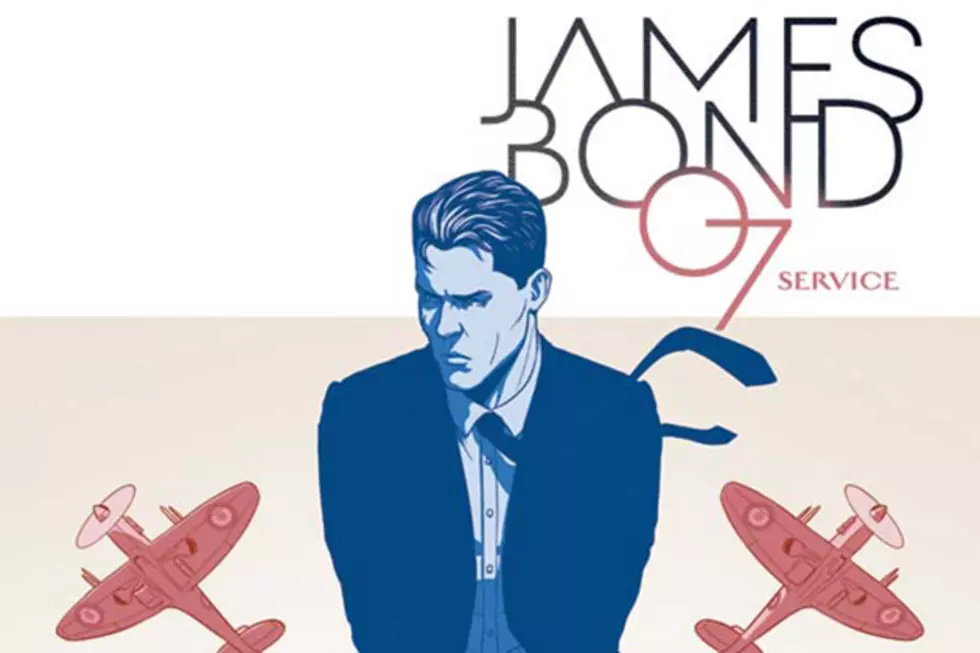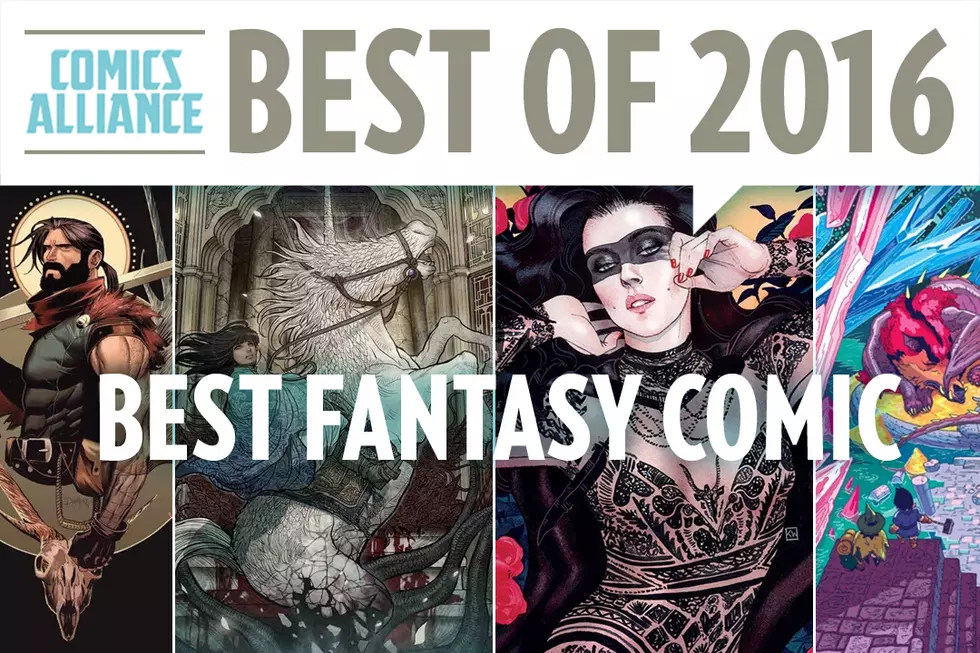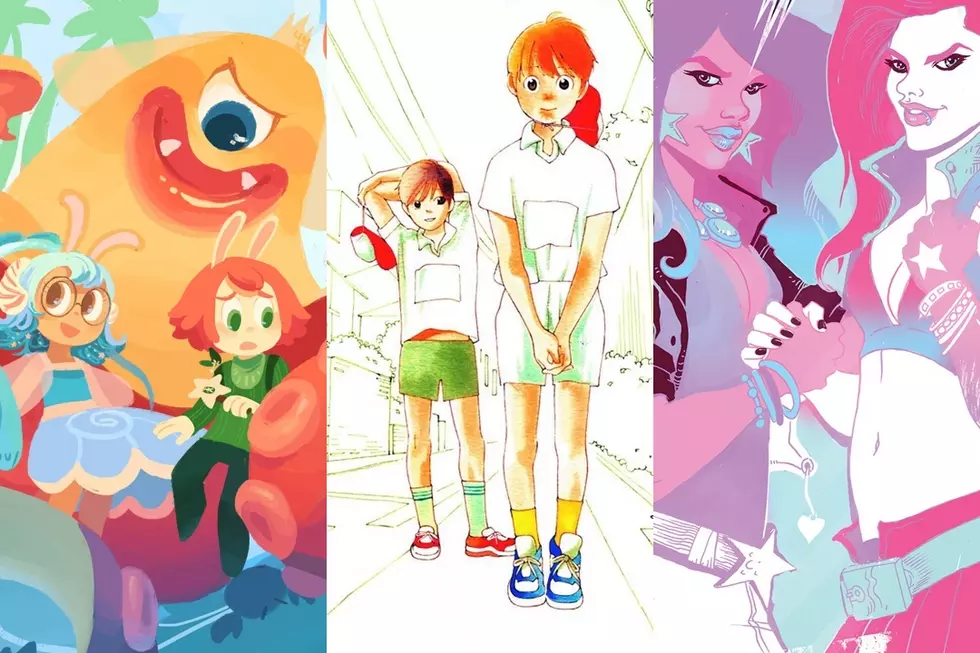![‘You Hunted Slaves!': Kieron Gillen on Spartan Culture and His New Series ‘Three’ [NYCC 2012]](http://townsquare.media/site/622/files/2012/10/three-lede.jpg?w=980&q=75)
‘You Hunted Slaves!': Kieron Gillen on Spartan Culture and His New Series ‘Three’ [NYCC 2012]

Two years ago, after New York Comic-Con, I invited--dragged might be a better word--Ryan Kelly and Kieron Gillen out to dinner with me and a few friends. I had in mind that they'd become friends and someday work together, and my nefarious scheme seems to have paid off.
At 2012's New York Comic-Con, Image Comics announced Three, a new five issue miniseries from Gillen and Kelly that explores a story well-known not only to comics fans, but to most of Western civilization: the story of Sparta.

"I came home from these regular monthly drinks that we have in London and grabbed one of the nice hardback comics next to the bed--and in this case it was [Frank Miller's] 300," Gillen explains. "I picked it up, flipped through it, really not very much paying any attention to it. And one of the speeches about 'The only free men the world has ever known,' and literally had a moment of incandescent rage and shouted at the book, 'You hunted slaves!' And at that second the entire plot of Three downloaded, including the twist, the structure, everything."
Because, of course, the Spartans might have been free, but their society was built on the labor and the deaths of the Helots--their slaves. They did the work that allowed the Spartans to concentrate on becoming the world's most feared warriors, and they died bloody deaths at the hands of the Spartans in order to hone their skills even further. As the young warriors reached adulthood, Gillen notes, they were sent out to "basically terrorize the countryside," killing the strongest Helots to prove their mettle.
Gillen and Kelly's story, then, inverts the heroic myth of 300 and gives us the story of three Helots on the run, years after the battle of Thermopylae (the setting of 300, for those unfamiliar), in a decaying Sparta. It's a story that should stand alone for those who haven't read Miller's work; Gillen calls it "inspired by it, but not literally about it." Rather, he calls it an "equal and opposite reaction" to the culture of Sparta, a society built on war and savage inequality. Though the story came from his anger at the way Spartans have been lionized and their cruelties forgotten, Gillen notes, "In a real way, the Spartans were just as f***ed by the system as the Helots were--not just as f***ed, but they were trapped and it ruined them," he explains. "As well as the three slaves who are the main characters, there's two prominent Spartan characters who are not unsympathetic."
Not that the Spartans aren't bad--they're plenty bad, he says, but: "I was going to demonize them as much as the Xerxes troops were demonized in 300, and in the end I wound up much more interested in trying to present an image of how Sparta operated."
He's enlisted a historical consultant, Stephen Hodkinson from the University of Nottingham, and jokes that sending his scripts to Hodkinson for approval "feels like sending in homework to be graded." The story is obviously fictional, but Gillen and Kelly want the setting to be as real as possible, with the limits that writing about unrecorded history from thousands of years ago obviously create. "I want this to be as credible a story as I can make it--as accurate as I can," Gillen says.
Kelly and Gillen had of course been fans of each other's work before they'd met, and so for Gillen Kelly was the right artist to take this ambitious step with. "I wanted to be with [Ryan] when he tore the face off the world," Gillen says. From Local to Northlanders to Saucer Country, Kelly is no stranger to diverse projects and changes in style, to pushing himself.
Three is an action story, but it's also a book that will be explicitly political, possibly more than either creator has done before. It's not just that it takes on a version of history that most people know and accept, but that it relates quite strongly to today's politics, both in Gillen's native England and here in the U.S. "What I find interesting about this story is the gap between when I conceived of it and the position we are in the world now. I think I conceived of this book before the economic collapse," Gillen says. "And suddenly the question of who provides for society and who is provided for by it and the economics of that, suddenly become much more topical. This is one of the things I fully expect and indeed hope people will read into the book."
A story of slaves and masters might not at first seem to be analogous to the 21st-century financial collapse and its economic echoes, but anyone who's paid passing attention to the U.S. presidential campaign knows that the candidates are fighting about who provides and who receives from the state. Gillen notes that Three is about social class, and that's actually a favorite theme of his, if usually not so overt. "I think anybody who looks at my stories from the last few years, it's very clear that class--I've done two long examinations of the class structure in Marvel Comics."
The collapse of Sparta, the internal failings that no one else sees, those are universal, he notes. "Human beings failing to uphold their ideals is interesting, because I think that's the most human thing in the world."
Asked which audience from his previous books would be most drawn to Three, Gillen says, "I think this is one that reaches out to a different audience. Even going back to my indie days, I can't think of anything that specifically feels like this." The Phonogram creator, known for posting public playlists of his writing music for Marvel books as well as the pop music series, doesn't have a playlist for this book. "I think I've written quite a lot of it in silence, which is quite rare for me."
Ultimately, it's a story that its creators believe in, a brutal action story with a meaningful core, a response to a familiar tale that they hope will take you somewhere unfamiliar and leave you enjoying the ride, and maybe doing some rethinking of the myths you're comfortable with. "When a story actually hits you really hard and you think this needs to be done, you sort of go for it," Gillen says.
More From ComicsAlliance
![Bond After Brexit: Kieron Gillen Declassifies ‘James Bond: Service’ [Interview]](http://townsquare.media/site/622/files/2017/03/Service_McKelvie-feat.jpeg?w=980&q=75)




![You, Me, Dancing: The Impact Of Gillen, McKelvie And Wilson’s ‘Phonogram’ [Music Week]](http://townsquare.media/site/622/files/2017/01/Phonogram-Featured.png?w=980&q=75)



